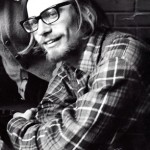 Ο Paul Williams, πρωτοποριακός μουσικός κριτικός και συγγραφέας, επιστημονικής φαντασίας, οποίος πέθανε στις 27 Μαρτίου στην Καλιφόρνια στην ηλικία των 64 ετών, δημοσίευσε βιβλίο με τίτλο “Ο Χάρτης , ή επανανακάλυψη της Rock and Roll”
Ο Paul Williams, πρωτοποριακός μουσικός κριτικός και συγγραφέας, επιστημονικής φαντασίας, οποίος πέθανε στις 27 Μαρτίου στην Καλιφόρνια στην ηλικία των 64 ετών, δημοσίευσε βιβλίο με τίτλο “Ο Χάρτης , ή επανανακάλυψη της Rock and Roll”
In 1988, Paul Williams – the pioneering music writer, science-fiction authority and lifelong Bob Dylan enthusiast who died on March 27th in California at the age of 64 – published a book called The Map or Rediscovering Rock and Roll: A Journey. It was a memoir of listening, self-examination and renewed jubilee from a long-missing voice.
Williams was a 17-year-old student at Swarthmore College in Pennsylvania when he founded the first journal of serious rock criticism, Crawdaddy, in January, 1966.
His reviews and analysis of Dylan, the Rolling Stones, the Doors and the Beach Boys’ Brian Wilson, especially during the genesis and collapse of Wilson’s intended masterwork, Smile, were cornerstones of the art form. As an editor and publisher, he gave space and license to other, influential writers such as Richard Meltzer, Jon Landau and Sandy Pearlman.
Paul Williams, Rock Criticism Pioneer, Dead at 64
By 1968, rock journalism was flourishing; Rolling Stone was in motion. But Williams had left the magazine and vocation he started, moving to California, where he began an important friendship with author Philip K. Dick, becoming the latter’s literary executor after his death in 1982. But in The Map, Williams returned to music writing, essentially by reviewing himself: describing in exuberant and grateful detail how he made his way back in the mid-Eighties via encounters, live and on record, with U2, R.E.M., Prince and the Jesus and Mary Chain, among many others. “To me, rock and roll is a living force, resilient and stubborn,” Williams wrote in his introduction to The Map. “The only thing to do with rock and roll is to participate in it.”
The Map marked a new beginning for Williams. He edited a revived Crawdaddy from 1993 to 2003 and published a defining three-volume study, Bob Dylan: Performing Artist, as well as books on Wilson and Neil Young, until silence fell. In 2009, complications from a brain injury Williams suffered in a 1995 bicycle injury had developed into early onset dementia, forcing Williams into managed care.
But I immediately recognized the incisive, sharing zeal of The Map, because I’d read it over and over in my original paperback copy of Outlaw Blues, a 1969 anthology that featured Williams’ early work for Crawdaddy. He was instrumental in my choice of principles as a listener and young, faltering writer – that immersive ideal; the responsibility to honesty; the privilege of celebration – and I was lucky to be able to thank him years later, when my review of the inaugural volume of Performing Artist turned into a treasured friendship.
By then, I had made and followed my own map. But Williams was always my encouraging, reliable guide.
Writer, Fan, Explorer
My first exposure to Williams’ way with words, insight and ardor came in his brief liner notes to the American edition of Procol Harum’s second album, 1968’s Shine on Brightly. “This is a wonderful record, kind of a letter from a friend I guess,” he wrote, going on to suggest an intriguing exchange of influences between that British group and the Band’s Music From Big Pink. “Procol Harum is a cornerstone of my existence,” he finished, “something I would have a craving need for were it not here.
That conversational intimacy, contagious delight and dogged pursuit of revelation defined Williams’ style as a critic – and also made him more than that. He wrote with judgment but not superiority or lazy censure; he worked to find paths and connections, through committed, often repeated listening, and presented the results as if you were a fellow traveler, not just a reader.
“Reading the book will not ‘explain’ the music to you,” Williams warned in the introduction to Outlaw Blues. “But it might bring you closer to the music, and closer to me.” Two of my favorite pieces from Williams’ first Crawdaddy era were not reviews at all, but extended Q&A sessions in Outlaw Blues with the Doors’ producer Paul Rothchild and Beach Boys associate David Anderle, in which Williams’ fascination with both bands and position on their records evolved in passionate, informed exchanges of experience and opinion.
“He was like a friend leaning on your shoulder, saying ‘You should check this out’ – and he always had smart reasons,” R.E.M. guitarist Peter Buck said in an interview when I wrote about Williams’ health crisis in 2009. “The passion was always there. You could tell that Paul was someone who wrote about things he actually cared about.” A pivotal example of that singular, almost defiant urgency – to only write when so moved, not just on deadline – is 1979’s Dylan – What Happened?, Williams’ compelling, independently published reflection on the singer’s surprising conversion to born-again Christianity in the late Seventies, with a detailed report from the front: Dylan’s provocative and acclaimed concerts at the Warfield in San Francisco that year. Williams had been away from active rock criticism for more than a decade. He wrote about the songs, Dylan’s singing and the music around it like he’d never left.
Williams’ author bio in Dylan – What Happened? noted that he “has been called ‘the father of rock journalism,’ a dubious honor at best.” It was a joke – and an honor he deserved nonetheless. He was the first of my breed, and he set fundamental standards for integrity and dedication. As a writer, Paul Williams never stopped listening. As a listener, he never stopped seeking. As a colleague, he expected the same. When Williams autographed my copy of Outlaw Blues in 1993, he wrote, “For David, Stay on the Edge!” – a reference to my review column at the time.
I do my best to stay there. And I’m there because of Paul Williams.
Read more: http://www.rollingstone.com/music/blogs/alternate-take/remembering-paul-williams-the-first-rock-critic-20130402#ixzz2PO2ADL2n
Follow us: @rollingstone on Twitter | RollingStone on Facebook
rollingstone.com









